A Cypriot Mayday Lost in the Air
- Share via
ROME — Exhausted and perhaps aware he was about to die, a flight attendant seized control of the doomed Cypriot airliner that crashed near Athens this month and repeatedly radioed a final mayday that was never heard, according to a report released Monday.
Minutes later, the jetliner with 121 people aboard slammed into a wooded hillside near Athens on Aug. 14 after a loss of cabin pressure incapacitated the pilots. The plane wobbled in the air for nearly two hours before running out of fuel and diving to the ground, the report said.
The crash of Helios Airways Flight 522 has endured as one of the more mysterious aviation accidents in recent times. It flew silently over Greece, failing to make radio contact, as many of its crew members and passengers apparently fell unconscious from a lack of oxygen.
Greek F-16 fighter jets were scrambled to determine what was going on, only to have their pilots report that they could see a copilot slumped in his seat, a pilot missing and, eventually, two flight attendants desperately attempting to save the aircraft.
The first preliminary report about the crash, released Monday by Transport Ministry chief investigator Akrivos Tsolakis, said that a sudden loss of cabin pressure and consequent oxygen starvation appeared to have rendered the pilots incapable of flying the Boeing 737. Sudden decompression leaves only seconds for pilots and others to reach oxygen supplies before falling unconscious.
It remains unknown why warning signals failed to alert the pilots to the oxygen loss, and why at least two flight attendants somehow remained on their feet.
One of them is reported to have been Andreas Prodromou, 25, a flight attendant who had been taking flying lessons. His blood is reported to have been found in the wreckage of the cockpit.
The report said he seized control of the plane and twice tried to issue a mayday distress call about 10 minutes before the crash and then again two seconds before impact. But, the report said, the radio was apparently set to an incorrect frequency.
According to Greek media, citing Defense Ministry sources, Prodromou desperately attempted to regain control of the jet, which was on autopilot at 35,000 feet. He managed to bank the plane away from Athens, lower it to 2,000 feet and then allow it to climb back to 7,000. The aircraft apparently ran out of fuel soon after that.
“We still don’t know completely what happened,” Defense Ministry official Anastasios Gouriotis said in a telephone interview from Athens. “We don’t know exactly what he was trying to do.”
He said it was clear that the plane ran out of fuel about two hours and 40 minutes into the flight from Larnaca, Cyprus, to Athens.
Gouriotis reiterated the government’s belief that terrorists were not involved.
“There were 15 minutes with no pilots over Athens,” he said. “You must understand, if there were terrorists, that’s when they could have done damage.”
Autopsy reports have shown that all of the passengers and crew members were still alive, though not necessarily conscious, when the plane crashed.
The preliminary report released Monday cited “indications of technical problems in the pressurization system” and “proof that the engines of the plane stopped working because the fuel supply was exhausted.”
“This was the final cause of the crash,” the report said.
It referred to the man believed to be Prodromou, the flight attendant, who had grabbed an oxygen mask and got into the pilot’s seat. “The tone of his voice suggested the person was a man who was suffering or was exhausted,” the report said, as cited by Greek media.
“It is still a mystery,” Gouriotis said.
More to Read
Sign up for Essential California
The most important California stories and recommendations in your inbox every morning.
You may occasionally receive promotional content from the Los Angeles Times.













